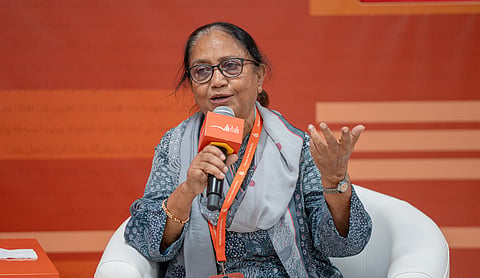SIBF 2025: Booker Prize winner Banu Mushtaq highlights stories of resistance and resilience
The author of Heart Lamp shares how her writing amplifies the voices of the unheard

Writer, activist, and lawyer Banu Mushtaq, the 2025 International Booker Prize–winning author of Heart Lamp, discussed perspectives on gender, faith, and social justice during a compelling session at the 44th Sharjah International Book Fair.
The discussion, moderated by Dr. Chitta Raghavan and bearing the title 'Women’s Lives, Identity and Resistance', centred on Mushtaq’s role as an author, legal professional, and campaigner originating from Karnataka, India. She observed, 'Through my identities only I have been recognised,' further stating, 'As a Muslim woman writer of Kannada, as an advocate, as a social activist, as a journalist. All these roles have a common thread: they are pro-people.'
Heart Lamp, translated into English by Deepa Bhasthi, has become a landmark for Kannada literature. Its narratives dwell on the experiences of Muslim women in the south of India, focusing on endurance expressed quietly. Mushtaq referenced one piece, High-Heeled Shoe, tracing a pregnant woman’s internal obstacles. She commented, 'That is her resistance,' and noted, 'Even in silence, there is strength.'
Throughout the session, Mushtaq disputed the notion that resistance always requires noise or confrontation. Instead, the characters she writes navigate their restrictions with subtlety and intention. 'My protagonists are tactful, not submissive. They are not cowards; they find their own ways to challenge what confines them,' she said.
Mushtaq considered identity’s many dimensions, stating, 'Each one of us lives under multiple identities,' and adding, 'As a follower of faith, as a gender, as a profession—we are all many things at once.' She pointed to dignity as a concept that binds these facets together, identifying it as vital both in fiction and society.
Addressing the realities of self-censorship encountered as a Muslim woman author in India, Mushtaq said, 'I often think and rethink every word I write,' and admitted, 'Sometimes I close a passage and keep it in storage. That is my challenge and my reality.' Despite these constraints, her writing has reached a broad audience, with readers actively picturing alternate futures for her characters. 'When a story grows in the reader’s mind, that is when the story truly begins to live.'
When the conversation turned to artificial intelligence and its role in writing, Mushtaq responded with careful optimism: 'We cannot condemn any invention,' she said. 'What matters is how we use it. As long as people write, think, and feel, literature will survive.'
She ended by reflecting on the significance of her recent honour, stating, 'It is not just my victory,' and concluding, 'It is the voice of many women, many struggles, that has been heard beyond borders.'
Sign up for the Daily Briefing
Get the latest news and updates straight to your inbox






